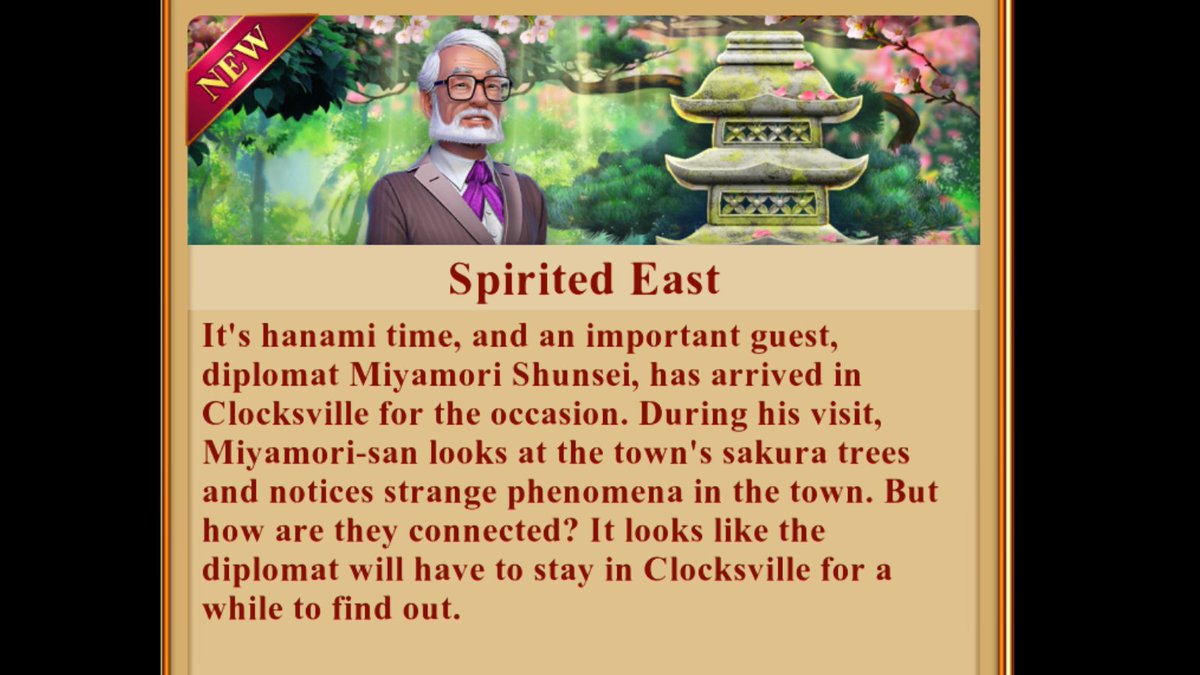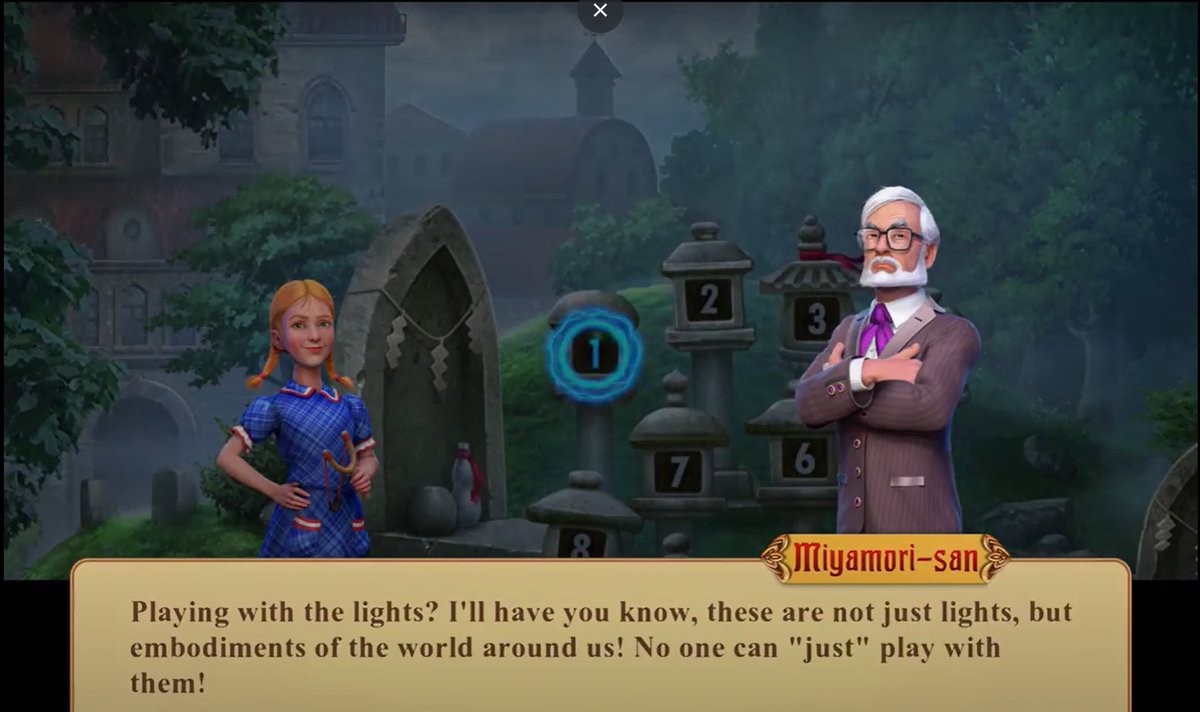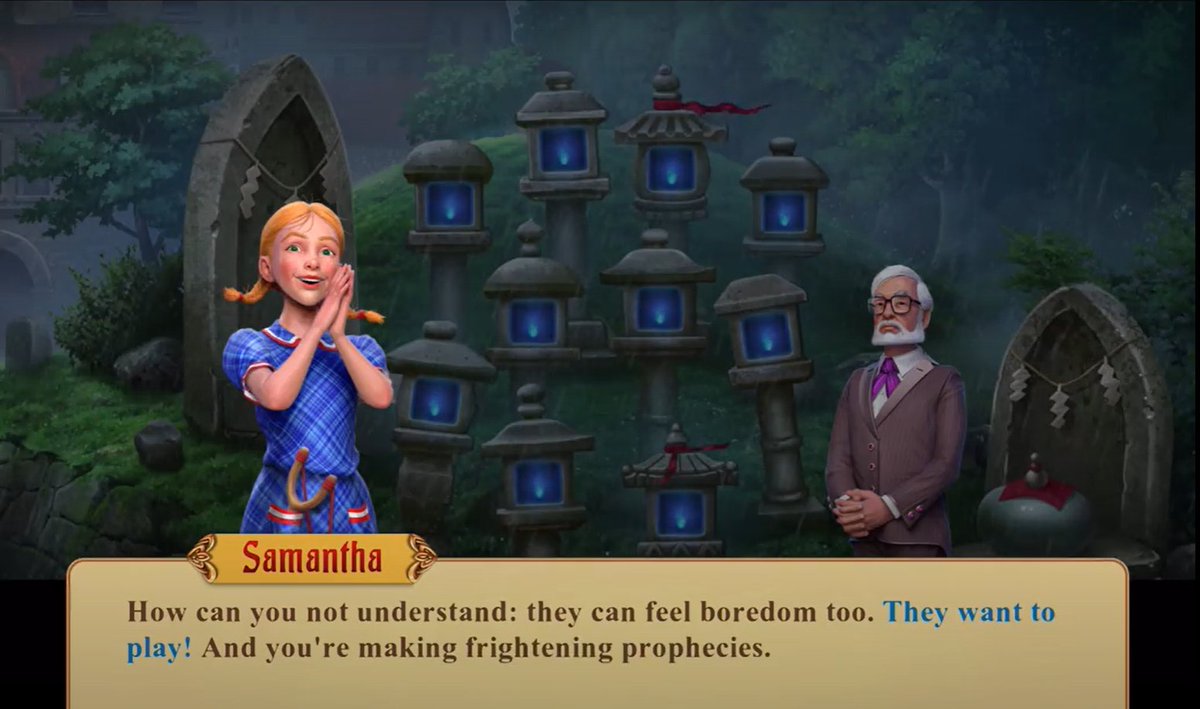
Post #E32021, I'm reminded of how religion + video games studies privilege blockbuster PC/console names. As my mother recently taught me, "filthy casual" mobile games can make significant, even sophisticated, claims too.
A #SmartInPublic🧵on #Shinto in Clockmaker. @Sacred_Writes
A #SmartInPublic🧵on #Shinto in Clockmaker. @Sacred_Writes
At first, @Belka_Games's Clockmaker looks like a typical Match-3 puzzle game. But a feature that sets it apart & captured my mother's attention is the seasonal event storylines.
She suggested I check out the "Spirited East" spring event as a scholar of Japanese religion & media.
She suggested I check out the "Spirited East" spring event as a scholar of Japanese religion & media.

Ok, let's get the obvious stuff out of the way. The Mr. Miyamori character is a dupe for #Ghibli animator #MiyazakiHayao. And the "Spirited East" title perpetuates a bananas orientalist binary of the 'modern, rational West' vs. the 'traditional, mystical East.' But let's dig in. 

The event narrative begins with Mr. Miyamori visiting to view the town of Clocksville's blooming sakura trees (*cough cherry blossom diplomacy cough*). He berates the townsfolk for not noticing that kami 神 (Shinto deities) are causing trouble & trying to send a message. 

Mr. Miyamori takes up the task of translation, explaining to the locals what kami are & how to communicate with them. He glosses the term kami 神 in multiple ways: nature spirits, spirits of objects, local spirits of the town, & embodiments of the world around us. Pretty fair tbh 

What's rly interesting is the exchange bn Mr. Miyamori & a young girl Samantha. She argues that Mr. Miyamori's pronouncements are mistaken. She posits that if kami are local spirits, they don't necessarily speak Japanese & the townsfolk might actually understand them better. 







Disabused several times of his claim to sole authority on kami affairs by virtue of his native Japanese-ness, Mr. Miyamori & the ppl of Clocksville discover that the kami are NOT punishing the town w/ natural disasters & strange phenomena for their ignorance as Miyamori assumed. 



Rather, the kami are trying to warn and protect townspeople from the disastrous effects of the wicked Clockmakers' perverse experiments with the natural flow of time. The locals learn to communicate with the kami directly and the town is saved.
What amazes me abt Clockmaker's "Spirited East" narrative is that it mirrors negotiations among global Shinto practitioners re: trad. authority & the historical significance of the local in kami veneration & the Japanese ritual tradition called Shinto.
religiondatabase.org/browse/1071/#/
religiondatabase.org/browse/1071/#/
Shinto is often characterized as the indigenous/ethnic faith of Japan. Some argue that for non-Japanese ppl or ppl living outside Japan to authentically practice Shinto, they should defer to/adopt Japanese methods, language, etc.
But many global Shinto practitioners, like Clockmaker's Samantha, wonder that if kami are essentially local deities, embodiments of the natural environs, then why shouldn't they adapt Shinto tradition to their particular locality? Is this not faithful?
What is Shinto? What exactly are kami? How do we relate to them, especially outside their native Japanese contexts? These are an incredibly sophisticated and thought-provoking question to puzzle out while casually matching colored jewels in the breakroom or between classes!
As @UNCG scholar of digital religion @gpgrieve notes in a pod for @ProjectRS, video games have been overlooked in religious studies as "low-brow" entertainment. This subfield is growing, but casual mobile games still suffer as the lowest of the low-brow.
religiousstudiesproject.com/podcast/video-…
religiousstudiesproject.com/podcast/video-…
I'm guilty of prioritizing engagement w/ religion in big-name console games myself. But w/ millions of ppl playing "casual, mindless" mobile games every day, we need to take them seriously. I plan to do better on my YT channel @eat_pray_anime
youtube.com/c/eatprayanime
youtube.com/c/eatprayanime
So, don't be afraid to get out there & play some games, even if you're a "filthy casual"! Then let's talk about them! Pitch an article to the Online-Heidelberg Journal of Religions on the Internet or Gamevironments.
heiup.uni-heidelberg.de/journals/index…
gamevironments.uni-bremen.de
heiup.uni-heidelberg.de/journals/index…
gamevironments.uni-bremen.de
Or pitch an essay to the new GAMING + Project, a digital public scholarship hub for all things videogames research!
Our CFP is currently open until June 30th.
Find out more here: networks.h-net.org/node/2622/disc…
Our CFP is currently open until June 30th.
Find out more here: networks.h-net.org/node/2622/disc…

@threadreaderapp unroll
• • •
Missing some Tweet in this thread? You can try to
force a refresh



